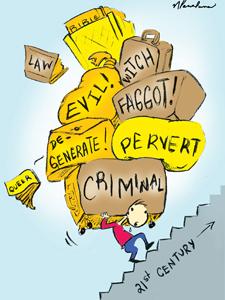Tom Warner’s history of Canadian gay activism, Never Going Back, offers a grim summary of our not-very-distant past:
“Homosexuals generally were seen and treated as criminal, sinful, sick, degenerate, furtive —members of an undesirable, almost subhuman, group against which acts of bigotry, discrimination, injustice, and violence were tolerated or even encouraged.”
Although bone chilling, the satisfying part of that sentence is knowing that it’s speaking about the past.
And so even with the occasional steps backward —the still-too-familiar “bigotry, discrimination, injustice, and violence” that Warner mentions —we’re comforted today by our unprecedented rights, visibility and freedom.
Historical change is on our side, right?
Louis-Georges Tin is not so sure.
A lit professor who lives in Paris, and the man who launched the first International Day Against Homophobia, Tin admits we’ve experienced “remarkable progress” in North America and Western Europe, but he also points out numerous setbacks.
In Africa, the Middle East and Eastern Europe (and so on: it’s a long list) the news offers little reassurance.
For Tin, homophobia is our greatest foe. The proverbial many-headed hydra, its vast negative power saturates individual psyches and entire cultural institutions. Homophobia is embedded in society’s understandings of “normal,” “good,” “natural” and “right,” and in Tin’s view that can only mean trouble.
Far reaching anti-homophobia activism has been Tin’s response to this situation, and it’s stretched from street protests to library shelves.
What may be Tin’s most ambitious project —the Dictionnaire de l’homophobie, an undertaking he calls a “work of knowledge and of battle”- appeared in France in 2003.
When it was published, Tin recalls, “Most reactions were very positive.”
“The book was perceived as the reference on the subject, and got very important coverage on television, radio and in newspapers. LGBT and human rights organizations were very enthusiastic. I received testimonies from many teachers, for instance, who did not care very much about gay and lesbian issues because, they said, they are not gay and lesbian themselves. But suddenly, when they read the Dictionnaire, they understood homophobia is a concern for all, because gay and lesbian rights are human rights.”
It wasn’t all good news, however.
Tin was fired from his university, a place that he says had no concern about him until his dictionary became a cause célèbre.
The brand new and updated English language translation will instantly impress readers with its scope and insight.
Poring over its 500 dense pages, though, a reader can’t help but notice that it is a volume that’s also a damper on the hurrah-for-Gay-Lib celebration.
If Tin’s corps of writers makes one thing plain it’s that gay liberation activism isn’t nearly ready for retirement.
Modernizing the “critical dictionary,” a kind of philosophical exercise popularized centuries ago by Voltaire, The Dictionary of Homophobia: A Global History of Gay and Lesbian Experience encourages readers to immerse themselves in the subject in diverse ways.
The Dictionary is organized around 5 key concepts: there are theories of homophobia; renowned agents (such as Anita Bryant) and victims (Oscar Wilde) of homophobia; countries and regions (a “panorama which, without being exhaustive, allows us to think of homophobia geographically and historically”); institutions (school, government, etc); and “homophobic rhetoric” —terms and ideas that homophobes unleash in order to discredit, oppress and stigmatize their enemies.
Coordinating 70 writers from a wide assortment of nations, Tin has assembled 160 essays that illustrate how virulent homophobia remains and how important it is to take actions against it.
The essays also suggest that select happy liberal pockets of the planet (like our own) can change for the worse in a moment. Vigilant awareness, the dictionary implies, is a necessary condition for our continued success.
From the first essay (“Abnormal”) to the last (“Workplace”), the Dictionary provides an eye-opening education. And, Tin says, its purpose is not limited to scrutinizing laws and customs in far-flung locales:
“Nowadays, in several countries of Africa, the question is not about how to decriminalize homosexuality, but rather about how to reinforce legislation against same-sex relationships. In about 10 countries in the world, in Iran and Saudi Arabia, for instance, death penalty is the reward for same-sex relationships. For us, this attitude seems totally barbaric. But, what about the terrible number of young girls and boys who commit suicide every year in our ‘modern’ and ‘liberal’ societies, just because they feel totally stigmatized and condemned by heterosexist norms?”
Despite the somber tone of the Dictionary, in conversation Tin remains firmly optimistic about the possibility of change:
“I think many things can be done,” he says.
“Every child should have at least one opportunity at home, and in his or her school time to hear about homophobia and transphobia. It means every parent, every schoolmaster should tackle these issues from time to time. There are many ways to do it.
“Moreover, speaking overtly, expressing one’s ideas, criticizing homophobic jokes publicly, are the beginning of honesty and courage. This everybody can do.”

 Why you can trust Xtra
Why you can trust Xtra


